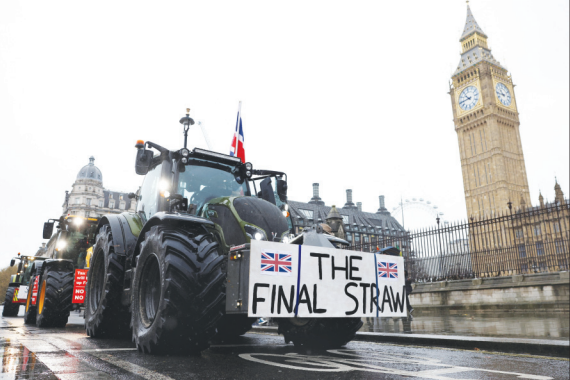How can increased VAT on farm products influence consumer behavior?
“`html
Farmers Take to the Streets of Central London: A Bold Stand Against Tax Changes!
The Context of the Protest
In recent weeks, farmers from various regions of the United Kingdom have gathering in Central London to voice their concerns over proposed tax changes that threaten the agricultural sector’s sustainability. This article discusses the motivations behind the protests, the implications of the tax changes, and how these changes impact the farming community and consumers alike.
Understanding the Proposed Tax Changes
The proposed tax changes include adjustments to agricultural subsidies, increased VAT on farm products, and alterations to tax relief measures for small farmers. These changes have sparked widespread debate and concern among farmers, who believe they could lead to:
- Reduced profitability in farming.
- Higher food prices for consumers.
- Potential job losses in the agricultural sector.
- Increased reliance on imported goods.
Farmers’ Voices: What They’re Saying
The protest serves as a platform for farmers to express their frustration and share their experiences. Key messages that have emerged from the protests include:
- “We feed the nation and need support, not additional burdens.”
- “Tax changes will push many small farmers out of business.”
- “Sustainable farming practices are at risk without proper financial support.”
Impacts of the Tax Changes
The proposed tax changes have far-reaching implications:
| Impact Area | Description |
|---|---|
| Profit Margin | Farmers may see reduced profit margins due to increased tax burdens. |
| Consumer Prices | Higher production costs could lead to increased prices for consumers. |
| Employment | Potential job losses as farms struggle to survive financially. |
| Food Security | Possible decline in local food production, leading to greater food insecurity. |
Benefits of Supporting Farmers
Supporting local farmers has numerous benefits, both for individuals and communities, including:
- Ensuring Food Security: Strong local farming communities contribute to a reliable food supply.
- Boosting the Economy: Spending on local produce strengthens the local economy and creates jobs.
- Environmental Stewardship: Local farmers often engage in sustainable practices that protect resources.
How You Can Get Involved
Here are some actionable ways to support the farmers’ movement:
- Participate in Local Protests: Join farmers in their protests and show solidarity.
- Contact Your MP: Write to your local Member of Parliament expressing your concerns regarding the tax changes.
- Buy Local: Support local farmers markets and buy produce directly from local farms.
- Spread Awareness: Share information about the tax changes on social media to raise awareness.
Case Studies: The Impact of Tax Changes in Other Regions
To understand the potential
Farmers Rally in London Against Inheritance Tax Changes
On Tuesday, a significant gathering of farmers took to the streets of central London, demonstrating their dissatisfaction with upcoming alterations to inheritance tax legislation. This policy shift from the Labour Party government is causing concern among agricultural operators who fear it could lead to hefty tax obligations and possibly compel them to divest family-owned land, jeopardizing the nation’s food supply.
The Historical Context of Inheritance Tax for Farms
Historically, since 1992, there has been a beneficial arrangement that permitted farms to remain within families without incurring inheritance tax liabilities. This measure was implemented to encourage ongoing agricultural work and enhance food security across the UK.
Proposed Budget Changes Spark Outrage
The recent budget outline introduced by Chancellor Rachel Reeves highlights significant changes slated for April 2026: inheritance taxes on farms valued above a specified threshold will now incur a lower rate of 20% instead of the standard 40%. Farmers facing these taxes will have the option to settle their dues interest-free over a decade, which contrasts sharply with typical arrangements where payments are due immediately.
National Farmers’ Union President Tom Bradshaw expressed his frustration during an interview with Sky News. He recalled that just one year prior, Steve Reed—the current Secretary of State for Environment, Food and Rural Affairs—assured farmers that such modifications would not occur.
“We were told last year at an event in London that agricultural property relief would remain unchanged… this industry feels betrayed,” lamented Bradshaw.
Economic Pressures on Farmers
Bradshaw noted that many farmers find themselves “asset rich but cash poor.” Despite playing an essential role in sustaining national food supplies, they struggle financially within operating margins that do not adequately support their livelihoods.
“The notion of increased taxation is appealing if we can achieve viable profit margins in food production,” he continued. “However, right now our returns along the supply chain simply aren’t sufficient.”
Government’s Justification for Change
Before leading protesters at their rally, Reed acknowledged shifting his stance after gaining insights into national fiscal challenges once he entered office. He stated on BBC radio that public service stabilization must adhere to fairness principles:
“It is only justifiable to ask wealthier farmers—and those affluent individuals acquiring farmland specifically as loophole solutions against inheritance taxes—to contribute equitably.”
Victoria Vyvyan from the Country Land and Business Association warned about potential repercussions these new guidelines might have on approximately 70,000 UK farms—harming family-run businesses while undermining food security as well. However, it is important to clarify this figure represents all eligible properties rather than those likely facing resultant bills annually.
According to estimates from BBC’s Verify unit and backed by Paul Johnson from the Institute for Fiscal Studies (IFS), only around 500 farms may realistically encounter this fiscal challenge yearly despite claims about widespread impact.
“These adjustments are set against some exceptionally high-value properties,” Johnson remarked during an interaction with Sky News while noting generous historical concessions still available under proposed rules compared with earlier times.
Political Voices Join Farmer Concerns
Kemi Badenoch—the Conservative Party leader—voiced strong opposition at today’s demonstration stating clearly her party comprehends farmers’ lifelong dedication: “We acknowledge how devastating this tax could be… We pledge our efforts toward reversing it unless immediate changes are made.”
In advance of protests commencing yesterday evening before mounting public outcry arose against policy proposals outlined services sectors impacted through financing reforms undertaken by Reeves:
“Revisions made ensure prosperous estates—and notably affluent farming operations—are rightly contributing towards investing vital resources into schools plus healthcare facilities relied upon within rural communities far outside urban centers.”


